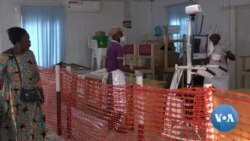ເຈົ້າໜ້າທີ່ສາທາລະນຸສຸກສະຫະລັດ ໄດ້ເກນເອົານັກບາສເກັດບອລ ທີ່ມີຊື່ສຽງທ່ານ Dikembe Mutombo ເຂົ້າຊ່ວຍໃນການຕໍ່ສູ້ຕ້ານການແຜ່ລະບາດຂອງ ອີໂບລາ ໃນບ້ານເກີດຂອງຜູ້ກ່ຽວ ທີ່ປະເທດຄອງໂກ.
ນຶ່ງໃນການລະບາດທີ່ຮ້າຍແຮງສຸດໃນປະຫວັດສາດ ທີ່ໄດ້ສັງຫານຜູ້ຄົນປະມານ 1,500 ຄົນ ແລະຕິດແປດໃສ່ 2,200 ຄົນ ນັບຕັ້ງແຕ່ ເດືອນສິງຫາ ເປັນຕົ້ນມາ.
ທ່ານ Mutombo ກ່າວໃນວີດີໂອ ທີ່ນຳອອກເຜີຍແຜ່ ໂດຍສູງການຄວບຄຸມແລະປ້ອງກັນ
ພະຍາດຂອງສະຫະລັດຫຼື (CDC) ໃນແວັບໄຊທ໌ຂອງອົງການດັ່ງກ່າວວ່າ “ຂ້າພະເຈົ້າ
ເວົ້າກັບພວກທ່ານໃນມື້ນີ້ ຍ້ອນຂ້າພະເຈົ້າເປັນຫ່ວງຢ່າງເລິກຊຶ້ງຕໍ່ປະເທດຂອງພວກເຮົາແລະຂ້າພະເຈົ້າຕ້ອງການຄວາມຊ່ອຍເຫຼືອຈາກພວກທ່ານ ເພື່ອສະກັດກັ້ນ ການລະບາດຂອງອີໂບລາ ໃນພາກເໜືອຂອງປະເທດ. ອີໂບລາ ແມ່ນເລື້ອງຈິງ. ໃນການແຜ່ລະບາດໃນປັດຈຸບັນນີ້ ແມ່ນເປັນການລະບາດທີ່ໃຫຍ່ທີ່ສຸດຂອງປະເທດ.”
ທ່ານ Mutombo ໄດ້ບັນທຶກສຽງແລະວີດີໂອ ໃນພາສາ Kiswahili, Lingala ແລະ ຝຣັ່ງ ທີ່ແນໃສ່ເພື່ອຮຽກຮ້ອງໃຫ້ປະຊາຊົນ ໃນເຂດທີ່ມີການແຜ່ລະບາດ ໃຫ້ມີຄວາມລະມັດລະວັງ ແລະໃຫ້ໄປຮັບການຮັກສາພະຍາບານ. ເຈົ້າໜ້າທີ່ແມ່ນພະຍາຍາມທີ່ຈະໃຫ້ສະຖານີວິທະຍຸແລະໂທລະພາບອອກອາກາດກ່ຽວກັບການຊັກຊວນດັ່ງກ່າວ ໃນຄອງໂກ.
ທ່ານ ໄດ້ບອກກັບ ອົງການຂ່າວ AP ວ່າ ທ່ານເຂົ້າໃຈວ່າ ເປັນຫຍັງ ຈຶ່ງບໍ່ມີຄວາມເຊື່ອໝັ້ນ ໃນເຈົ້າໜ້າທີ່ສາທາລະນະສຸກ ຢູ່ໃນຂົງເຂດ. “ຜູ້ໃດກໍຕາມທີ່ບໍ່ເບິ່ງຄືທ່ານ ບໍ່ຄິດຄືທ່ານ, ແລະບໍ່ແມ່ນຄົນມາຈາກບ້ານຂອງທ່ານ ເປັນຄົນທີ່ມາຈາກເຂດອື່ນ ທີ່ຫາກໍເດີນທາງໄປຍັງບ້ານຂອງທ່ານ ດ້ວຍລົດບັນທຸກສີຂາວທີ່ສວຍງາມ ແລະບອກທ່ານວ່າ ‘ການຊີດຢາເຂົ້າໃນຮ່າງກາຍຂອງທ່ານ ແມ່ນເພື່ອປົກປ້ອງທ່ານຈາກເຊື້ອໄວຣັສທີ່ເປັນອັນຕະລາຍຮ້າຍແຮງນີ້.’ ສະນັ້ນ ມັນຈຶ່ງມີການຕໍ່ສູ້. ນີ້ລະ ແມ່ນບ່ອນທີ່ຈະມີບັນຫາຂັດແຍ້ງກັນຂຶ້ນ,” ນັ້ນຄືຄຳເວົ້າຂອງທ່ານທີ່ໄດ້ກ່າວໄວ້.
ແຕ່ຍ້ອນວ່າ ທ່ານແມ່ນຄົນມາຈາກປະເທດນີ້ ທ່ານໄດ້ກ່າວວ່າ ທ່ານຈະແມ່ນເປັນຜູ້ທີ່ເຊື່ອຖືໄດ້ຫຼາຍ. “ຂ້າພະເຈົ້າເຊື່ອວ່າ ໃນຖານະທີ່ເປັນລູກຊາຍ ຂອງປະເທດຄອງໂກ, ຂ້າພະເຈົ້າຄິດວ່າ ສຽງຂອງຂ້າພະເຈົ້າ ສາມາດທີ່ຈະໄດ້ຍິນ ເພາະວ່າ ທຸກໆຄົນ ໃນປະເທດນີ້ ຮູ້ເຖິງຄວາມໝາຍໝັ້ນຕັ້ງໃຈ ຕໍ່ຄວາມມີມະນຸດສະທຳ ແລະດ້ານສຸຂະອະນາໄມ.”
ທ່ານ Mutombo ໄດ້ຍ້າຍມາຢູ່ສະຫະລັດໃນຊຸມປີ 1980 ເພື່ອຮຽນການແພດ ແຕ່ບໍ່ດົນຫຼັງຈາກນັ້ນ ກໍໄດ້ກາຍເປັນດາລາບານບ້ວງມະຫາວິທະຍາໄລຈອຣຈ໌-ທາວນ໌. ທ່ານໄດ້ກາຍເປັນຜູ້ປ້ອງກັນທີ່ຍິ່ງໃຫຍ່ທີ່ສຸດຄົນນຶ່ງ ໃນປະຫວັດສາດສະມາຄົມບ້ານບ້ວງສະຫະລັດ ແລະເປັນທີ່ຮູ້ກັນດີກ່ຽວກັບວຽກງານເພື່ອການກຸສົນທີ່ປະເທດບ້ານເກີດຂອງທ່ານ.
U.S. health officials have recruited basketball Hall of Famer Dikembe Mutombo to help fight an Ebola outbreak in his native Congo.
One of the deadliest outbreaks in history has already killed about 1,500 people and infected another 2,200 since August.
"I am speaking with you today because I care deeply about our country, and I need your help to stop the Ebola outbreak in the north part of the country. Ebola is real. The current outbreak is the country's largest ever," Mutombo says in a video posted by the U.S. Centers for Disease Control and Prevention (CDC) on its website.
https://www.cdc.gov/vhf/ebola/outbreaks/drc/Dikembe-Mutombo-Ebola-PSA.html
Mutombo recorded radio and video spots in Kiswahili, Lingala and French designed to urge the residents in the outbreak areas to take precautions and get care. Officials are trying to get radio and TV stations in the Congo to air them.
He told the Associated Press that he understands why there is distrust of health officials in the area. "Someone who doesn't look like you, who doesn't think like you, who is not from your village, who is from other places, just walk to your village with a nice beautiful white truck and telling you ... 'Inject this chemical into your body to protect you from this deadly virus.' That's where there's a fight. This is where we're having a conflict,'' he said.
But since he is from the country, he said, he would be more trustworthy. "I believe, as a son of Congo, I think my voice can be heard. Because everyone in the country knows my commitment to the humanity and the health.''
Mutombo moved to the U.S. in the 1980s to study medicine but was soon a star of the Georgetown University basketball team. He went on to become one of the greatest defensive players in NBA history and is known for his philanthropic work in his homeland.
U.S. health officials decided to seek Mutombo's help after the U.S. State Department last year ordered CDC disease specialists to stay out of the outbreak areas because of safety concerns.
In the video, Mutombo recommends seeking treatment, staying away from those infected, following safe burial procedures and accepting vaccines if offered them.






